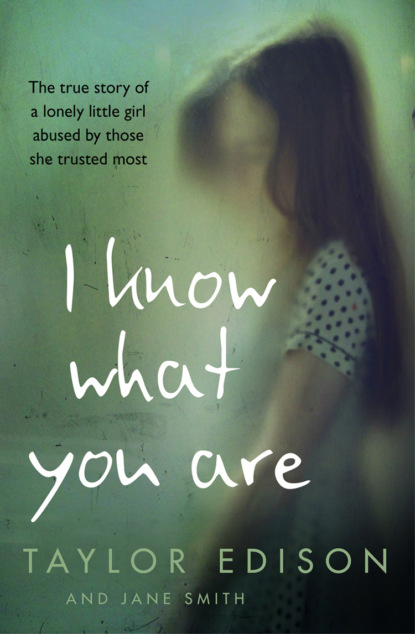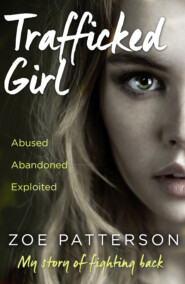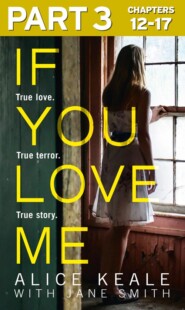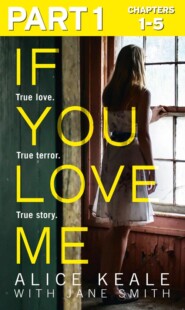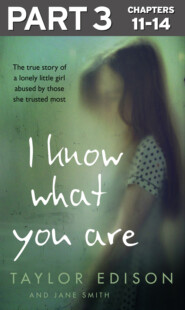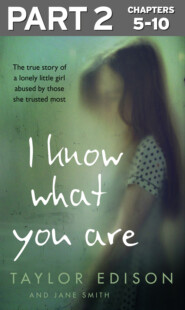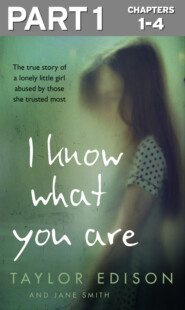По всем вопросам обращайтесь на: info@litportal.ru
(©) 2003-2024.
✖
I Know What You Are: The true story of a lonely little girl abused by those she trusted most
Настройки чтения
Размер шрифта
Высота строк
Поля
For the people who were Mum’s friends at that time, there weren’t any boundaries between things that were sexual and non-sexual, which meant that, when I went to school, I had to learn, incident by incident, what was okay and what wasn’t. So I wasn’t expecting my teacher’s furious reaction when she found me sitting in the classroom one day with my hand inside the trousers of the little boy next to me. What might have passed as innocent exploration at the age of three or four was viewed as something entirely more sinister at seven. In reality though, I was still very naive.
Gavin was the youngest in a family of several neglected children, most of whom were aggressive and quarrelsome. But Gavin was different, and because he was always nice to me and always stood up for me when someone teased or bullied me, he became my ‘boyfriend’. After that day, however, the teacher made us sit on opposite sides of the classroom. And I learned that, for some reason, putting your hand inside someone else’s trousers was not ‘acceptable behaviour’.
Most of my other memories I have of school are associated with feeling confused, overwhelmed and quite lonely. There was an avenue of trees in the school grounds where I often sat on my own, picking up small stones and putting them in my pocket. Mum used to say she could tell from how many I had collected what sort of day I had had. Just a couple of stones was a sign that I had played with Gavin and some of the other kids. A whole pocketful meant I had been alone during all the playground breaks.
I sometimes felt as though I was the only person in the world. I did have a few friends by the time I was seven, but Mum didn’t ever make friends with their parents. In fact, she didn’t have any relationships with women while I was growing up; just with guys. So there didn’t seem to be any connection between my life and the lives of anyone I knew, which meant that, in a way I can’t explain, I didn’t feel as though I was part of anything.
I can remember feeling as though there was a huge, sad sigh building up inside me – although I couldn’t have explained it that way at the time – and if I started to let it out, I wouldn’t ever stop sighing. The reason it was there was because I rarely understood why the teachers shouted at me and why the other kids laughed. I can’t pick out any individual voices – except for the voice of the male teacher who used to shout at me – but there always seemed to be at least one angry face glaring at me, or someone sniggering and sneering at something stupid I had said or done. That was why I was always hiding – behind the bookshelves in the library, in the wings on the stage, or in the avenue of trees, picking up stones where all the other kids playing in the playground couldn’t see me.
I know now, after studying child development at college, that there are two types of socialisation: primary, which children are taught at home by their parents and other members of their family, and secondary, which is what they learn at school. Apparently, if a child hasn’t learned the first type, you can’t expect them to understand the second. I had a huge handicap already, due to the Asperger’s, and it wasn’t helped by the fact that no one had ever attempted to teach me to share or take turns with other people.
When we lived in Cora’s flat, Mum and her friends talked, of course, but there were no conversations, and no one ever said please or thank you. If I wanted something, I simply tugged repeatedly on someone’s shirt or head-butted them until they gave it to me. But although they didn’t teach me anything that would have been useful to know before I was thrown into a classroom with a lot of other kids, they didn’t shout at me either, like everyone at school seemed to do.
It was the shouting that really frightened me. And when I was frightened, I panicked. As a result, I spent quite a lot of my time sitting on a wooden chair in the corridor outside the head teacher’s office. Sometimes, I was in trouble because I had kicked off; more often, as I got a bit older, it was because I had walked out of the classroom with the intention of going home. I was always stopped by a teacher on those occasions, but I did escape several times when I waited until playtime and asked one of the older boys to give me a leg-up over the playground wall. When I got home, Mum would make me a sandwich and take me with her to the pub.
I was always running away, from home as well as from school. On one occasion, when I was seven and Gavin’s family had moved to a house outside town, I cycled all the way there on my bike and told his parents that Mum had dropped me off at the corner of the street. Gavin’s grandad was a friend of Mum’s and he had driven me to Gavin’s new house a couple of times and then taken me home again afterwards, which is how I knew the way. Having an almost photographic memory is one of the more useful aspects of the Asperger syndrome, and I had memorised the route without even realising I was doing it. What I wasn’t so good at was understanding cause and effect or imagining how other people might react in particular situations, so I was more surprised than I should have been when Mum tracked me down and shouted at me.
Although Mum was angry with me for cycling to Gavin’s house, she didn’t seem to mind when I ran away from school. What she did object to were all the phone calls asking her to go in to discuss what could be done about my unauthorised absences. Apparently, that was why she didn’t ever have a job: ‘It was your fault,’ she told me later. ‘How could I get a job when you didn’t ever stay in school for more than five minutes at a time?’
When I was eight, we moved out of the house with the muddy bathroom and into a council house in the countryside. It was a nice house, with two bedrooms and a little garden with fields behind it – a palace compared with the place we had lived in before. But it was too far out of town for me to be able to travel to my old school. So I went to a new one, on a rundown council estate where the teachers were far better equipped to deal with kids with problems, like me. In fact, a lot of the kids at my new school were far worse off than I was, in one way or another. I was still ‘different’ though, and I still found it difficult to fit in.
Although our house was owned by the council, it was on an estate of houses that were mostly privately owned. Our new neighbours weren’t friendly towards Mum and me, and although I did make some friends, they all lived on the council estate, where the school was, several streets away. When we lived in town, Mum’s friends used to drop in all the time, but they didn’t have cars or money for transport. So she was very lonely at the new house too. I think we both felt very isolated, just the two of us living on our own in the middle of nowhere. Things hadn’t been great before, with all the problems I had had at my previous school. After we moved to the countryside, they began to get a lot worse.
It was probably the stress – of starting at a new school for me, and of the loneliness for Mum – that caused our arguments to intensify after we moved. Loneliness was almost certainly the reason why Mum’s excessive house cleaning became a full-blown obsession. She was constantly scrubbing, sweeping, vacuuming and decorating, touching up barely visible scratches on skirting boards or sanding down and repainting door frames whenever I knocked off even a flake of paint. Eventually, I became so paranoid about touching anything that I hated being in the house at all.
Because I was unnerved and distressed by change of any kind and because I wanted to spend as little time as possible at home, I was even more anxious than I had always been to have a friend. That probably explains why I started to spend time with a rather unpleasant and unhappy boy called Kieran, who lived down the road. After a slow start, I was good at reading by the time I was eight. I was certainly much better than Kieran was and I used to go round to his house to read him stories. We always sat side by side in his bedroom when I was reading to him, and I would have my hand inside his trousers, touching him the way he told me to. I didn’t mind doing it; it seemed a small price to pay to have a friend, even one who wasn’t particularly nice to me.
Although I was miserable in the new house, I did quite like my new school. There was another primary school that was closer to our house on the private estate, but my previous school had given me such a bad report that it wouldn’t take me. So I ended up at the one a bit further away, on the council estate, which actually turned out to be a good thing, because the teachers were nice and didn’t shout or push the kids around and I started to do quite well academically.
I think that, for me, part of the problem at my last school had been the fact that a lot of the other kids were well behaved and academically able. A substantial proportion of them were the children of Asian parents who took education very seriously. After I had been assessed and diagnosed with Asperger syndrome, the teachers there expected me to take the tablets I had been prescribed, then do as I was told and behave myself. When that didn’t happen and I continued to be one of only very few badly behaved children, no one really knew what to do with me. At my new school, however, there were lots of kids with learning difficulties and some with severe autism. So my problems seemed fairly minimal by comparison.
It may sound like an odd thing to say, but one of the good things about my new school was that the hallways were carpeted. Just that simple fact made a huge difference to me, because it made the whole environment less noisy and therefore more manageable. The teachers seemed to understand that the cacophony of chaos can have a bad effect on a child with autism. They used to let me stay in the classroom for five minutes while all the other kids went to lunch, so that, by the time I followed them into the dining room, the corridors were empty and quiet again.
As well as having my fears taken seriously, another new experience for me was feeling that my teachers liked me, perhaps because it was apparent to them that I really did want to learn. When they had worked out what teaching method suited me best, I began to flourish. Within the space of a few weeks, I had gone from being one of the most disruptive children in my class at the old school to being what almost amounted to teacher’s pet at the new one. More importantly, I no longer wanted to climb over the playground wall and run home, because school had become a refuge for me and somewhere I wanted to be.
I have a type of Asperger syndrome that impacts on my social skills rather than on my ability to learn. In fact, I have always found that I can absorb information quite easily and that I’m good at focusing my attention on things, although that means I sometimes get a bit fixated on subjects that particularly interest me. What I do find difficult is trying to decipher meaning and innuendo. As a child, I thought people meant exactly what they said, so I didn’t understand jokes or sarcasm. I am a bit better at it now, but it’s still a problem for me. What it all meant when I was at school was that unless the learning process was specifically tailored to my disabilities, so that it didn’t rely on social cues, I often didn’t understand what the teacher was saying.
For example, I couldn’t translate idioms. So when a teacher said, ‘We can’t go out into the playground this morning because it’s raining cats and dogs’, I took it literally and looked out of the window expecting to be astonished. Then, when I saw that it was simply raining, I was baffled and bemused. I often felt lost and anxious in the classroom, because so much of teaching is about interaction, which is something I simply didn’t understand.
It all became much less of a problem, though, when I started at my new school, where the teachers let me learn in my own way, using books I could work through at my own pace. Some of the teaching methods were a bit unconventional. For example, one of my teachers was dyslexic and used to have to spell everything out on a little hand-held computer. But that was just what the other kids and I needed – teachers who were prepared to mould our education to our needs, rather than trying to mould us to fit standard techniques that wouldn’t have worked for us and would have ended up making us feel even more stupid than we already believed we were.
Suddenly, having been apparently hopeless at everything, I began to do really well, in the classroom and in all my exams at the end of the first year. I only had to read the textbook a couple of hours before I took an exam and I could remember every word and every diagram on every page I had read. The only questions I couldn’t answer were the ambiguously worded ones.
Ten years ago, when I was at that school, disability legislation wasn’t the big news it is today. Kids like me, who had ‘problems’, were side-lined and simply contained and controlled as much as possible until they were old enough to leave full-time education. So I am still very grateful to those teachers for making me realise I wasn’t stupid after all.
My best subject at school was English, particularly writing stories and poems. Not even the best of my teachers could have done anything about the fact that I am hopeless with numbers, and not very good at science either. Even today, I simply don’t get numbers. Although I can read and write down 2 + 2 + 3, the numbers are just shapes that don’t make any sense to me. So I forget them immediately. However, if I write the same sum as ‘two plus two plus three’, it makes perfect sense. I can understand the words because I can visualise and remember them, which I can’t do with numbers.
What’s weird, according to all the special education people who eventually assessed me, is that despite not being able to make sense of numerals, I can read maps. Apparently, that meant I didn’t fit into any of their categories, which made them really annoyed with me because I messed up their tests by not doing what I was expected to do. Maybe they’ve found out more about Asperger syndrome since then and no longer expect everyone to fit neatly into at least one of the boxes that dictate, ‘If you have got this sort of learning disability, your brain will respond in this way to this stimulus’.
The only thing that mattered to me at the time, though, was that at least I was happy at my new school, even if I was very unhappy at home. After we moved into our new house, I started comfort eating, which was something Mum seemed to encourage. Perhaps she was trying to compensate me for the constant arguments and rows we were having. But giving me two chocolate éclairs for breakfast every day simply created new problems without solving any of my existing ones.
I was already a bit chubby, so it didn’t take long for me to become obese. And because I was very ashamed of the way I looked, I started hiding at school again – not to escape being shouted at by my teachers this time, but to avoid having to do PE and expose my overweight body to the ridicule of the other, much thinner, kids. In fact, many of the kids at my school were probably underfed and quite malnourished, although of course I didn’t realise that at the time.
I think it was because I was overweight that I started my periods early, when I was ten. Mum didn’t ever explain what was happening, except to say ‘All women do it’, and I can remember feeling dirty and very embarrassed every time I bled. What made things even worse was that Mum would give me sanitary pads to take to school, which, for some reason, I had to hand over to my teacher, who put them in a cupboard in the classroom. But because I would have died rather than ask the teacher in front of the whole class if I could take one out before going to the toilet, I wore the same one all day. Inevitably, I started getting infections, which aggravated the terrible period pains I already suffered from and made me feel even more ashamed about the disgusting, inexplicable thing that was happening to my body.
Eventually, the stress of it all got so bad I stopped going to school whenever I had my period. Then my schoolwork began to suffer and I gradually lost the prized, confidence-boosting academic position I had held near the top of the class.
I was still coping though, most of the time. And then, in my last term, when I had just turned 11, my class paid a visit to the secondary school I would be moving on to after the summer holidays. My first impression was that there didn’t seem to be any proper school building, just a collection of pre-fabs with large windows and echoing hallways. But it was what was happening inside the buildings that made me anxious. There were about 60 kids in every classroom making a noise that seemed to reverberate off every solid surface. I knew within minutes of arriving at that school that I wasn’t going to be able to manage there.
It was a sign of how comfortable I was with the teachers at my primary school that I talked to one of them after that visit and told her how I felt. As a result, it was decided that someone would try to find out whether there were any alternative arrangements that could be made for me. What I think it needed, too, was for Mum to push on my behalf. But she didn’t do things like that. I don’t know if anyone did try to make other arrangements for me. If they did, it never came to anything. And it didn’t really matter, as things turned out, because by the time the new term started, my childhood had been halted dead in its tracks and everything had changed.
Once the last term ended, I didn’t see any of the kids from my primary school anymore. The area I lived in was very strongly class divided: the private-estate and council-estate kids didn’t go to the same schools and didn’t mix outside school either. So I didn’t know any of the kids who lived near me, and none of my friends from school ever came to the private estate where I lived. I suppose it was mutual segregation – the class barrier worked both ways.
During term time, I used to go down to the council estate on my bike to see friends. But it wasn’t an area most people would have chosen to walk through, because there was a lot of tension due to the gang culture that existed there. Although I was too young to attract much attention, I had begun to feel a bit uncomfortable as an outsider, even before the summer holiday started. None of us kids had mobile phones, so I couldn’t simply phone a school friend and arrange to meet somewhere else. And as Mum hadn’t made friends with any of the other mums, there was nothing to help keep those relationships alive. So, at the end of the school year, I suddenly lost all my friends and had nothing to do except hang around at home, getting under Mum’s feet.
It was one thing not really wanting me to go to school in case she needed company during the day, which she did a lot after we moved to the new house and she lost her social network. It was quite another having me there all the time, whether she wanted company or not, and during that summer holiday she seemed forever to be telling me to go away and leave her alone. I walked for miles that summer, on my own, through the tunnel that ran under a half-finished motorway and out across the fields into open countryside. I did it just to get out of the house. Then, one day, I made a friend, and suddenly I no longer felt as though I was the only person in the world.
Evie lived with her boyfriend and two children in a flat in one of the few other council-owned houses on the private estate, just a few doors away from us. She had been badly abused as a child and had learning difficulties. So although she was 18 when I met her, she seemed younger, and certainly wasn’t capable of looking after her children on her own.
Evie’s little girl, Zoe, was two years old, and the baby just a few months. I wasn’t very interested in the baby, although I did feel sorry for her having to lie for hours in a filthy nappy before Evie seemed to notice and bothered to do anything about it. But I did love Zoe, and often when I took her home with me. I would take her little sister too. Surprisingly, Mum would sometimes help me bath them and then look after the baby while I played with Zoe, which was a relief because the baby cried a lot. I think it was the fact that the children were dirty that triggered her mothering instincts, because, to her, keeping your children clean is a mother’s primary, perhaps only, responsibility.
What I really liked doing was taking just Zoe home with me. On the days when that happened, I would ransack the house for coins and take her to the second-hand shop in town to buy her some new clothes out of the 50p bucket. Then we would go to the public toilets, where I would change her into them before taking her to the park, all dressed up and looking nice.
That was all I did for most of that summer, go on long walks on my own and babysit for Zoe. I continued to babysit for her when the new term started. I don’t think anyone ever really believed I was going to go to the secondary school. I wasn’t aware of anyone from social services coming to look for me, although I suppose someone must have done. They must have contacted Mum too, but, again, I don’t remember her saying anything about it. She certainly never asked me why I wasn’t going to school. So, somehow, I just slipped under the radar. For the next few months, Mum cleaned the house and did whatever else she was doing and I spent most of my days with Evie or Zoe, out of Mum’s hair and happy not to be on my own.
In fact, I developed a crush on Evie. She was childlike in many ways and I was very naive, so it wasn’t until much later that I realised she was far more sexually aware than I understood at the time. We often used to play-fight. I would chase her around her flat and when I caught up with her she would pretend to grope me. Her boyfriend, Tom, never said very much, but he would often watch us mucking about. It was for his sake she was doing it, of course. But I didn’t know that, any more than Evie knew that what she was doing would turn out be a big mistake, for both of us.
Chapter 4 (#u8e3adb8e-bdb6-524d-bda5-7127df3c8be2)
Tom, Evie and their kids would sometimes come round to our house and Tom would offer to cook supper for us all. Mum has never been very articulate when it comes to saying what she wants. So when they turned up at the front door, uninvited, with Tom holding carrier bags full of ingredients for the meal he wanted to make, she just shrugged and let them in.
I loved having people in the house again, instead of it just being Mum and me. Usually, it was more like a shrine to cleaning products than a home, and I liked sitting at the kitchen table listening to everyone talking and laughing, even if it was only for a couple of hours. Despite her apparent indifference, I think Mum liked it too, because she was at least as lonely as I was. She probably would have preferred it if Evie and Tom had come without the kids though, and if I hadn’t been there either.
‘You know why he comes round here, don’t you?’ she would often say to me after they had gone. ‘He’s sniffing round you. It’s obvious what he’s after.’ I had no clue what she meant. I was 11 years old and no one had ever explained to me about the birds and the bees. Although I had seen people having sex when I was very young, I had only recently found out where babies come from, by reading an article in one of Evie’s magazines, which actually left me more bemused than informed. And anyway, although I quite liked Tom, it was Evie I was infatuated with.
Tom was obviously crazy about her too. What he didn’t know, however, was that while he was at work, Evie often saw other men. Living in that town, it was a secret she wasn’t going to be able to keep forever, and eventually people began to gossip. But it was Zoe who gave it away in the end. If I wasn’t available to babysit, Evie had to take the children with her when she went to meet whatever guy she was currently seeing behind Tom’s back. When Tom got home from work one evening and asked Zoe what she had been doing all day, she told him, and then added, ‘And Mummy was kissing a man at the bus stop.’
After things began to go wrong between them, Tom started coming round to our house on his own. He would cry as he talked about their relationship and how he really wanted to work things out with Evie, and I would do my best to comfort him. Then I would tell him about the latest row I had had with Mum and he would sympathise with me and tell me that whatever had happened wasn’t my fault. Gradually, as we became closer, I started to believe that he was the only person who really understood me. Until then, it had always been Mum and me against the rest of the world. Now, it was Tom who was my only real friend and ally.
Sometimes he came round to our house just after I had had a screaming argument with Mum and had retreated to my bedroom, slamming the door and turning my music up as loud as it would go. Tom would have a cup of tea with Mum and then come upstairs and sit with me on the bed, listening while I told him what had happened, then smoothing my damp hair and telling me everything was going to be okay. Mum isn’t the sort of person who gives comfort or cuddles, or even brief hugs. When I was angry or upset, her reaction was to shout even more loudly than I was doing, and I always ended up feeling worse than I had done to begin with. So it was a new, and very pleasant, experience to be listened to and sympathised with.
I don’t really know what sort of relationship there was between Tom and Mum, or if there was any particular reason why she would storm out of the house if he came up to my room without first stopping to have a cup of tea with her. She didn’t like anyone giving me attention that could have been paid to her. So it may simply have been jealousy and there may have been nothing between them at all. Perhaps her reaction was just another facet of the many tensions that existed at that time as a result of the complicated cross-relationships between Evie, Tom, Mum and me.
I still wasn’t going to school. I spent most days with Zoe, waiting for Tom to finish work so that we could go on a bike ride or hang out together. Despite the fact that there was an age difference of more than ten years between us, Tom was the best friend I had ever had. But then something happened that changed our relationship and made everything even more complex and confusing than it already was.
It was an evening in December and I was in my bedroom wrapping Mum’s Christmas present when Tom knocked on the door and came in. I was already in my nightie and when he touched the bow on the front of it, his hand rested on my boob just long enough for me to notice but without it seeming weird. Then he started talking about Christmas and I probably wouldn’t have remembered what he had done if it had remained an isolated incident. In fact, things escalated so slowly after that night I hardly noticed what was happening.
At first, it was just rough and tumble, the sort of games a brother and sister or any other kids might play. Then one day he kissed me, on another day he lifted up my top to look at my boobs, and before long I believed that we were ‘in a relationship’. He never put pressure on me to do anything I didn’t want to do. If I tried to turn away while he was kissing me, for example, he always stopped immediately. He did everything in a way that made me believe, at 11 years old, that it was what I wanted. And when he asked me to do things I didn’t want to do, I did them because I wanted to please him and because I was tired of being lonely and he was my only friend.





